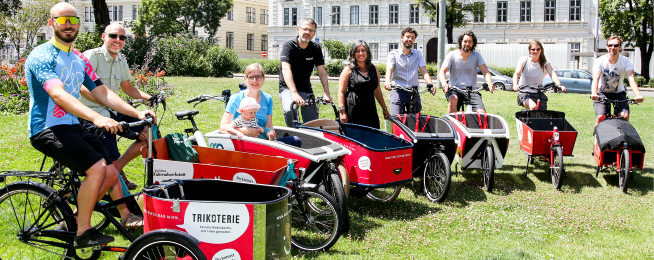Vienna is one of a number of cities that has seen amazing success with bike share schemes that feature e-cargo bikes.
In fact these schemes often feature just cargo bikes. And they're a hit.
There are a number of reasons emerging to explain the source of such popularity. Cargo bikes are quite expensive, and you possibly don’t need to use them every day. And, if you lack fitness, they can require a bit of effort top move stuff around.
By adding electric assist, and making them shareable and low-cost, these hurdles are overcome.
In Vienna, subsidies from the City means they are free.
In 2017 Vienna created a funding program focused on subsidizing private and business cargo bikes as a sustainability initiative.
One part of this subsidy was used to introduce a cargo bike rental program for various neighbourhoods, organised and managed by local stores and the communities themselves.
The Vienna Mobility Agency, a municipal department of the city, was given the task of searching for appropriate locations and operators and subsequently installing the system.
In July 2017, the “Grätzlrad Wien” (which translates roughly to “cargo bike Vienna”) program, an online platform, started its services, with full support from the city administration.
Cargo bikes are now available in 13 neighborhoods and have had more than 2,000 bookings as a climate-friendly and free alternative for people running daily errands.
According to the agency, users have ranged from DJs cycling to their concerts, film teams renting bikes for their movies, and parents trying cargo bikes for the first time.
They are often seen on the streets carrying small children, groceries, small furniture, and pets.
Renters choose and book the bikes online, and with a 50 Euros refundable deposit, they can rent them for up to 24 hours, with some operators offering them for the whole weekend.
One of the Grätzlrad service points is hosted by MO.Point, an Austrian company that plans, implements, and operates shared mobility solutions on behalf of municipalities and real estate developers.
Stefan Arbeithuber, Managing Partner at MO.Point Mobilitätsservices, says one of the challenges is that a condition for the subsidised program was that hosts offer the cargo-bikes for free.
Due to the frequent usage, the costs for maintenance were higher than calculated and even exceeded the initial purchase price of the cargo-bike itself.
“As a private mobility operator, we believe that subsidies are very attractive to implement and steer these new mobility offers. But to be feasible in the long run, the business models must work without subsidies.”
Similar schemes have been implemented in Basel, Switzerland; Salzburg, Austria; Bologna, Italy; and München, Germany.
Expansion plans for the Grätzlrad program depend on both continued funding and the willingness of operators.
Currently the program is being evaluated and analysed by a study with the Vienna University of Technology, taking in feedback by both the operators and the users.
“We aim to learn specifically how people use Grätzlrad and whether it helps to forgo car-use,” a spokesmen for the Agency says
“We are also evaluating the operators experience, as they voluntarily rent out the cargo bikes in addition to their core business, which is generally running a shop or a restaurant.”
Become our friend
Find out more about Bicycle Network and support us in making it easier for people to ride bikes.


